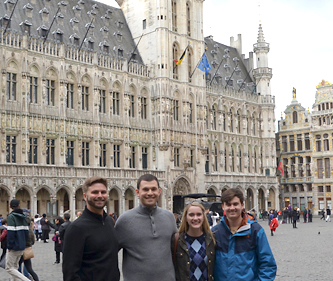The University of Virginia School of Law is becoming the team to beat after two consecutive victories in the International and European Tax Moot Court, held in Belgium last week.
Students Colin Giuseppe Cox ’19, Elizabeth Donald ’19, Benjamin Kramer ’19 and Griffin Peeples ’20 comprised the winning quad, with David Rubin ’19 serving as student coach and Professor Ruth Mason acting as faculty adviser.
Cox and Peeples argued in the final round, and Peeples was named best oralist and best individual advocate for the taxpayer’s side, based on scores from previous rounds.
“It’s really exciting to go to a competition and the other teams see you as a defending champion,” Peeples said. “I will be coaching the team next year, and hope that I can use our experience this year to make it a three-peat.”
Cox, a native of the U.K. who has experience in investment banking, said internalizing the case from the opposing side’s point of view facilitated the win.
UVA Law, the only U.S. team to advance to the oral pleading round in Belgium, defeated six-time champion Vienna University of Economics and Business in the final round. The Law School competed against teams from Germany and Belgium in the first round and teams from Brazil and Luxembourg in the semifinals. Schools from all over the world participate in the competition, which is organized by the International Bureau of Fiscal Documentation and the University of Leuven, in conjunction with the global professional services firm Deloitte.

This was only the third year the Law School has fielded a team. The 2018 team, which included Rubin, was the first U.S. squad to win the competition, and the first team in 2017 made the semifinals. UVA Law has one of the most prestigious tax law programs in the United States, ranked No. 5 among U.S. law schools by U.S. News & World Report.
The students participated in the moot as part of Mason’s International Tax Practicum class. Professors Joe Fore ’11, co-director of the Law School’s Legal Research and Writing Program, and Andrew Hayashi, an expert in tax law and policy, also helped prepare the students.
“The resources and time that the Law School puts into the moot shows our dedication to experiential learning in general and our commitment to tax training in particular,” Mason said. “We have a talented tax faculty, and Virginia alumni can be found in tax leadership positions throughout the world — in private practice, academia and government.”
Donald said Mason inspired her to get into tax law and has been a valuable mentor who has taken the time to connect her with attorneys and experts in the field, including while they were in Belgium. Mason said she wants to promote Donald and students like her who are interested in becoming tax academics.
“All of the European tax lawyers and students love Professor Mason as much as we do,” Donald said. “Upon telling someone that we were from the University of Virginia, their first question was, with great enthusiasm, ‘So, you know Professor Mason?’ She is quite the international tax star!”
The competition began with a written phase in October. In the final round, the teams represented a fictitious taxpayer in a set of facts they received Wednesday night. Students had 24 hours to write a new brief and then argue it Friday morning in front of the other teams.
“This is the part of the competition that really allows our students to shine,” Mason said. “Several colleagues from other institutions commented to me about our students’ broad and deep understanding of the tax law and the policies that undergird it. Tax courses at UVA emphasize both technical accuracy and policy focus.”
The competition was also an opportunity to make international connnections.
“Despite being very busy preparing and delivering our arguments, we managed to make friends with teams from across Europe,” Kramer said. “We exchanged ideas about how our disparate legal systems operate and how our legal educations systems differ.”
In addition to applauding the competition’s many networking opportunities, Mason said she has been heartened to see how past teammates have kept up with each other after graduating. She, too, keeps in touch with former students, meeting up with them when she gives papers or attends tax section meetings.
“One of the wonderful things I have observed over the three years that we have participated in this competition is how the members of the team bond with each other and how they support each other,” she said. “It is also wonderful to see how much their colleagues back in Charlottesville root for their success.”
Founded in 1819, the University of Virginia School of Law is the second-oldest continuously operating law school in the nation. Consistently ranked among the top law schools, Virginia is a world-renowned training ground for distinguished lawyers and public servants, instilling in them a commitment to leadership, integrity and community service.


